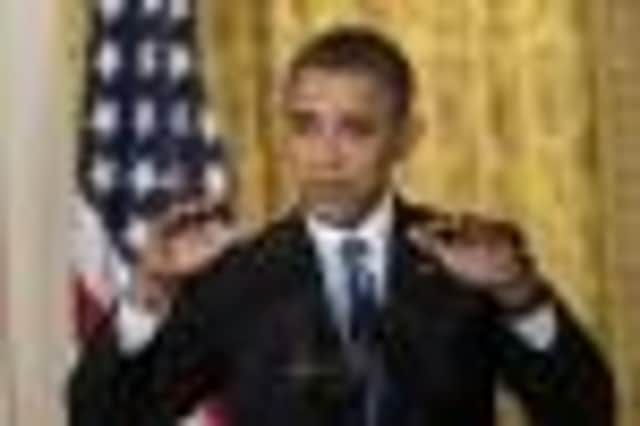Alex Massie: Masochism lends note to fiscal dance


In the 1950s, the popular American humorous songwriter Tom Lehrer enjoyed a hit with a ditty titled The Masochism Tango. “Bash in my brain,” he sang, “And make me scream with pain, Then kick me once again.” This could usefully serve as the theme song for the latest budget drama crippling Washington as Barack Obama and his Congressional opponents fight another round of the Austerity Wars.
In the absence of an utterly improbable last-minute deal, today will see the federal government forced to slash spending by $85bn as part of a deficit-reduction programme neither the Obama administration nor Congress really wishes to implement. The non-partisan Congressional Budget Office estimates these spending cuts – known as “the sequester” – will lower economic growth this year from 2 per cent of GDP to 1.4 per cent.
Advertisement
Hide AdAdvertisement
Hide AdThe sequester is a guillotine arranged as a stop-gap after the last round of Congressional wrangling over the ever-increasing federal budget. In 2011, a first tranche of $1 trillion of spending cuts over the next decade were agreed, but no deal could be reached over a subsequent $1.2 trillion of cuts.
The sequester, a series of supposedly unpalatable but automatic spending cuts, was designed to persuade Congress to agree a long-term deficit-reduction programme that balanced spending cuts with additional revenue-raising measures. No such agreement has been made. In this game of chicken, neither the Obama administration nor Congressional Republicans, have blinked. Accordingly, discretionary federal spending on everything from university research grants to air traffic control will be cut by 9 per cent this year, while even the once-sacred Pentagon budget will be slashed by 13 per cent. Total federal spending for the coming year will be reduced by 2.4 per cent this year. It was not supposed to be this way. The sequester was supposed to concentrate minds. Jay Carney, the White House press secretary, said: “We don’t want it. We think that it’s bad policy. The sequester was written in a way that would ensure that Congress would never let it happen.” And yet it seems certain to happen. Mr Obama trusts that the American public will blame Republican obstructionism in Congress; Republicans bet that the public will scarcely notice an $85bn cut in a $3.6 trillion federal budget. All this highlights the extent to which politics in Washington has become more like politics in other countries. The 50-year process of placing politicians in their proper party has been completed. Liberal Republicans are all but extinct and there are very few remaining conservative Democrats. Consequently, the parties are more orthodox and more united than at any time in living memory. Deal-making, once considered a sign of statesmanship in Washington, has become instead a sign of weakness, even of capitulation.
This latest budget battle, however, has introduced a new wrinkle to the rules by which these attritional Congressional battles are fought: a zero sum game in which everyone appears to lose. Thwarting your opponents has become more pleasurable than compromising and gaining half of what you might want yourself.
It is a problem that is, in part, of the President’s own making. Mr Obama twice campaigned on a promise to make the tax cuts passed by George W Bush “permanent” for almost 99 per cent of American families. The rich will pay more, but Mr Obama has accepted the Republican-inspired definition of the “middle-class” being anyone who does not earn more than $250,000 a year. That necessarily limited the administration’s room for fiscal manoeuvre.
So America’s politicians find themselves trapped by their own rhetoric and, just as significantly, by the public’s own contradictory desires. The American people routinely tell pollsters that, in general terms, they favour decreasing government spending but they also oppose cuts to specific government programmes.
Front-loading spending cuts, however, is likely to reduce American economic growth this year. The chairman of the Federal Reserve, Ben Bernanke, told Congress this week: “Besides having adverse effects on jobs and incomes, a slower recovery would lead to less actual deficit reduction in the short run.” Congress, he said, “should consider replacing the sharp, front-loaded spending cuts required by the sequestration, with policies that reduce the federal deficit more gradually in the near term but more substantially in the longer run”.
Mr Bernanke’s comments reflect a growing consensus among bankers and economists that austerity, at this time, is a well-intentioned fiscal error. Another problem is that sequestration only concerns itself with so-called “non-discretionary” federal outlays. In other words, federal spending on health care and social security is protected. But it is rising costs of Medicare and Medicaid that are the chief drivers of increased federal spending. Hence the Obama administration has been busy highlighting the supposedly catastrophic impact of the sequester deal on everything from nursery care to disease prevention.
On Capitol Hill, however, brinkmanship has become the default order of battle and business. Another budget battle, this time over funding for federal government agencies, looms at the end of March and the prospect of a complete shut-down of the federal government is by no means unthinkable. The last time that happened, Newt Gingrich’s Republicans in Congress received more of the blame than President Bill Clinton. Mr Obama bets that Republican obstructionism will tarnish an already-soiled GOP brand still further. He may be right. But the failure to reach a budget deal also makes it harder for the President to advance his own agenda. Masochism will remain Washington’s preferred fetish for some time yet.